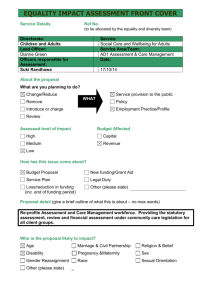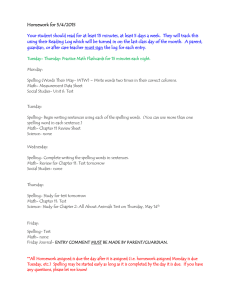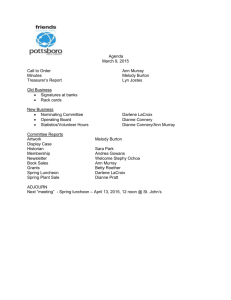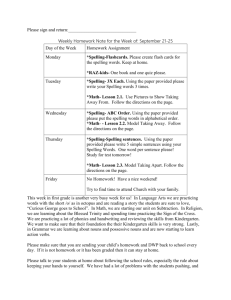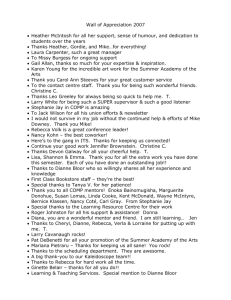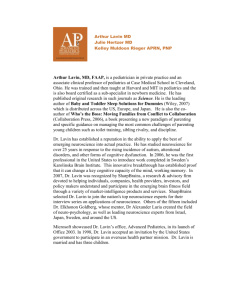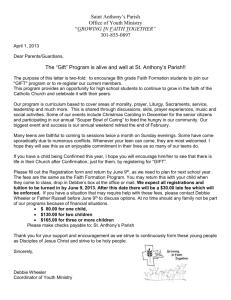welcome to curriculum night
advertisement
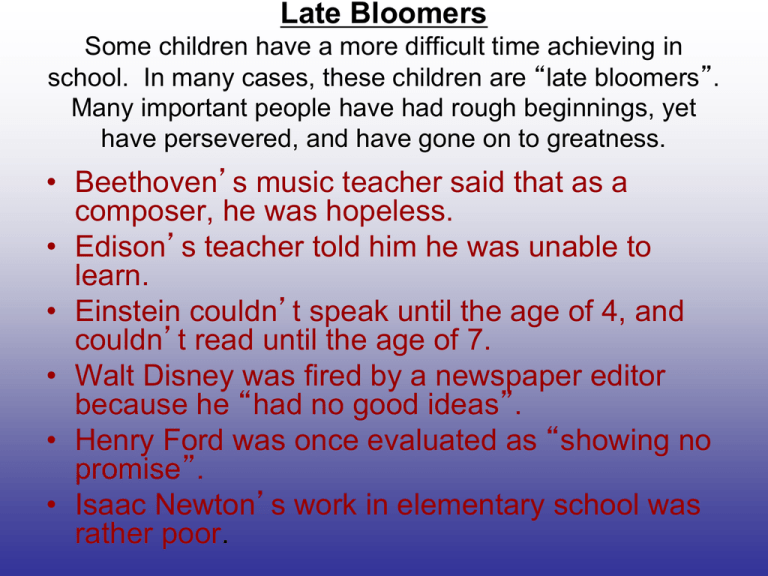
Late Bloomers Some children have a more difficult time achieving in school. In many cases, these children are “late bloomers”. Many important people have had rough beginnings, yet have persevered, and have gone on to greatness. • Beethoven’s music teacher said that as a composer, he was hopeless. • Edison’s teacher told him he was unable to learn. • Einstein couldn’t speak until the age of 4, and couldn’t read until the age of 7. • Walt Disney was fired by a newspaper editor because he “had no good ideas”. • Henry Ford was once evaluated as “showing no promise”. • Isaac Newton’s work in elementary school was rather poor. WELCOME TO CURRICULUM NIGHT Debbie Bonacci Kevin Lavin Dianne Sato Language Arts- presented by Dianne Sato • Comprehensive Literacy ***Reading, Writing, Word Study • The Solon City Schools district policy- Differentiation – Whole group – Small group – Individually • Independent reading book-Must be in school EVERYDAY • Reading logs: on-line with biweekly summary • 3 on rubric is end of year goal. • Vocabulary emphasis Research for Reading • Correlational studies • The major finders were: – The amount of reading is related to their reading achievement. – Reading at home = higher achievement Reading Benefits Achievement percentile Minutes of reading per day Words per year th 10 1.6 51,000 th 50 12.9 601,000 th 90 40.4 2,357,000 Math- presented by Kevin Lavin • Curriculum is the text • Grade is based on the child’s level of understanding • Focus is on: – Problem-solving – Developing new ways of thinking – Building connections & explaining their thinking Math- continued • Cooperative learning is key • Interacting and communicating with team members enlightens the group to different perspectives • Problems can be solved in multiple ways • Every child has something important to share Math- continued • The teacher is there to support, not dictate information • We want to develop the child’s ability to think and investigate for him/herself • Topics are continuously revisited (spiral) and connected • Success= active participation and new, deeper understanding of math Math- continued • CPM has created a multitude of resources for you, as parents, to utilize – Homework help – Parent guide – Extra practice • Find these and more at cpm.org! P2: Use words and symbols to describe numerical and geometric patterns, rules and functions. Question # Possible Point Value 18 1 19 2 20 1 21 1 22 1 23 1 Earned Point Value Level of Understanding for P2 concepts: Full Most Some Little None Science-presented by Debbie Bonacci Guided Inquiry Approach • Cells • Rocks • Energy • Minerals • Soil • Matter Assessments in science: • Process labs • Application worksheets (formative) • Final unit (summative) • Vocabulary knowledge is necessary to answer application type questions. • • • We are alternating science and social studies units throughout the year. Binder is needed for class-no textbook Please pick up assessment schedule on the table in my room. Social Studies-presented by Debbie Bonacci • • • • • • • • 6th Grade Social Studies Curriculum World Geography Ancient River Civilizations West Asia- RELIGIONS (Hinduism, Buddhism, Islam, Christianity, Judaism) Africa- GOVERNMENTS East Asia- ECONOMICS Europe Australia • Please share personal experiences at home/school • • • • MATERIALS NEEDED FOR CLASS: Loose leaf paper 1 binder Books are provided in class for certain units • Many projects done in class using technology. Learning is a group effort! Achievement Tests and District Assessments- Kevin Lavin • Reading Achievement Test: April 29th • Math Achievement Test: April 30th • Test scores follow students to SMS. • Avoid making appointments on these days. • Common Assessments- Must be signed by a parent/guardian • Formative Assessments: (exit slip/entrance slip)- a type of in class “quiz” given to check each child’s understanding along the way. These provide information as to who needs intervention/enrichment. Great idea to use to study for assessments. Success Criteria/Learning Targets Debbie Bonacci • state indicators for 6th grade • terrific study tool for the assessment • found in the binder for each subject • filled out by the student Grading- Dianne Sato • Rubrics are used to grade writing. (Mechanics, Expository, Narrative, Persuasive) • Reading is a letter grade- based on evidence from the midterm and quarterly assessments. • Science and Social Studies and Math are letter grades based on the grading guidelines-not a percentage grade. Homework/FIS- Debbie Bonacci • Practice • No more than an hour a night • Use the agenda • Posted on website • Homework is lighter on the weekends. • A homework DROP SPOT is a great idea. • Students are discouraged from calling home to bring in forgotten items-SORRY! Team Discipline -Debbie Bonacci • • • • • • • • • • * Team Rules I keep hands, feet, and objects to myself. I bring appropriate materials to class. I raise my hand and wait to be called on. I follow directions the first time given. I keep classroom materials in the proper place, in an orderly fashion. School Rules BE PROMPT Be POLITE BE PREPARED BE PRODUCTIVE Rewards Positive note home, Call home, Chip in jar, Prize bin, Luncheon, Quiet ball, Sent to Mrs. Minneard or Mrs. Firehammer for a positive meeting Be sure to look at the behavior checklist each week as you sign your child’s agenda. (Signatures are due on Monday-or first day of week.) Snack Time is during Independent Reading from 12:10-12:50. Please send a healthy snack! Activity Period• • • Dianne Sato Every morning from 8:45-9:25 3 days a week students are in band/choir/orchestra/study hall (combination) 2 days a week in homeroom (students will be reading, doing curriculum work, extending learning, etc.) • • Please ask your child for his or her schedule If you need to make appointments-this time is the best, rather than during rotations PARENT-TEACHER CONFERENCES Due to the limited number of conference spots available at OMS, a first round of conference letters will be sent to parents of students we need to see in October. A second round of conference letters will be sent to all others who we may not need to see at this time, but who may still wish to schedule a conference with teachers. As always, conferences occur at OMS year-round. If you need to arrange a conference at any time during the school year, please contact the OMS Guidance Office.
